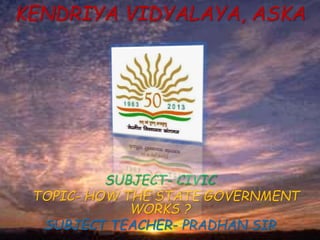
Civic
- 1. KENDRIYA VIDYALAYA, ASKA SUBJECT- CIVIC TOPIC- HOW THE STATE GOVERNMENT WORKS ? SUBJECT TEACHER- PRADHAN SIR
- 3. • Who is an MLA? • MLAs are people who are elected by voters and who go on to become members of the Legislative Assembly. On being elected they may go on to form the government and represent the people of their constituency.
- 4. • What is a Legislative Assembly? • A Legislative Assembly is found in every state of our country. All states are divided into different constituencies. Let us take the state of Himachal Pradesh as an example. It has been divided into 68 assembly constituencies. For each constituency, people vote for one representative who later goes on to become a Member of the Legislative Assembly (MLA). These MLAs stand for elections in the name of different political parties and therefore, represent and belong to these parties.
- 5. • How do people who are MLAs become ministers or Chief Ministers? • MLAs from political parties who have won more than half of the constituencies in a state can be said to be in a majority. The political party who is in majority is called the ruling party and all other members are known as the Opposition. • Post the elections, the MLAs from the ruling party elect their leader who goes on to becoming the Chief Minister. The Chief Minister then selects other MLAs as his ministers. Once that is done, the Governor of the state appoints the Chief Minister and all other ministers. • The Chief Minister along with his ministers are responsible for running various government offices and ministries. They all have separate offices. It is at the Legislative Assembly where all the MLAs, from the ruling and opposition party meet to discuss various things. Therefore some MLAs have dual responsibilities – one as an MLA and the other as a minister.
- 6. A debate in the legislative assembly • In the Legislative Assembly, MLAs discuss about current problems. At this debate, MLAs can express their views and ask questions related to the issue or give suggestions about what the government can do to solve the problem. Those who wish to, can respond to this. The minister then replies to the questions and tries to assure the Assembly that adequate steps are being taken. • It is the responsibility of the Chief Minister and his ministers to take decisions and run the government. We usually learn about these decisions through various channels such as television news, newspapers and radio. However, decisions that are to be implemented, must has approval from all members of the Legislative Assembly. A democracy allows these members to ask questions, debate over an important issue, decide where money should be spent, etc.
- 7. Working of the government • The Legislative Assembly is not the only place where opinions are expressed about the work of the government and action is demanded. A number of newspapers, TV channels and other organisations regularly discuss about the working of the government. In a democracy, there are a number of ways by which people can express their views and also take action. • If there is a need for a change in the government’s way of working, then it is the responsibility of the people in power like the Chief Minister and his ministers to take necessary action. They also have to answer questions that are asked in the Assembly and convince those people asking questions that proper steps are taken. At the same time, newspapers and the media widely discuss issues and the government has to respond, for example, by holding press conferences. • In a democracy, it is the people who elect their representatives as Members of the Legislative Assembly (MLAs) and, thus, it is the people who have the main authority. The ruling party members then form the government and some members are appointed ministers. These ministers are in charge of various departments of the government. Whatever work is done by these departments has to be approved by the members of the Legislative Assembly.
